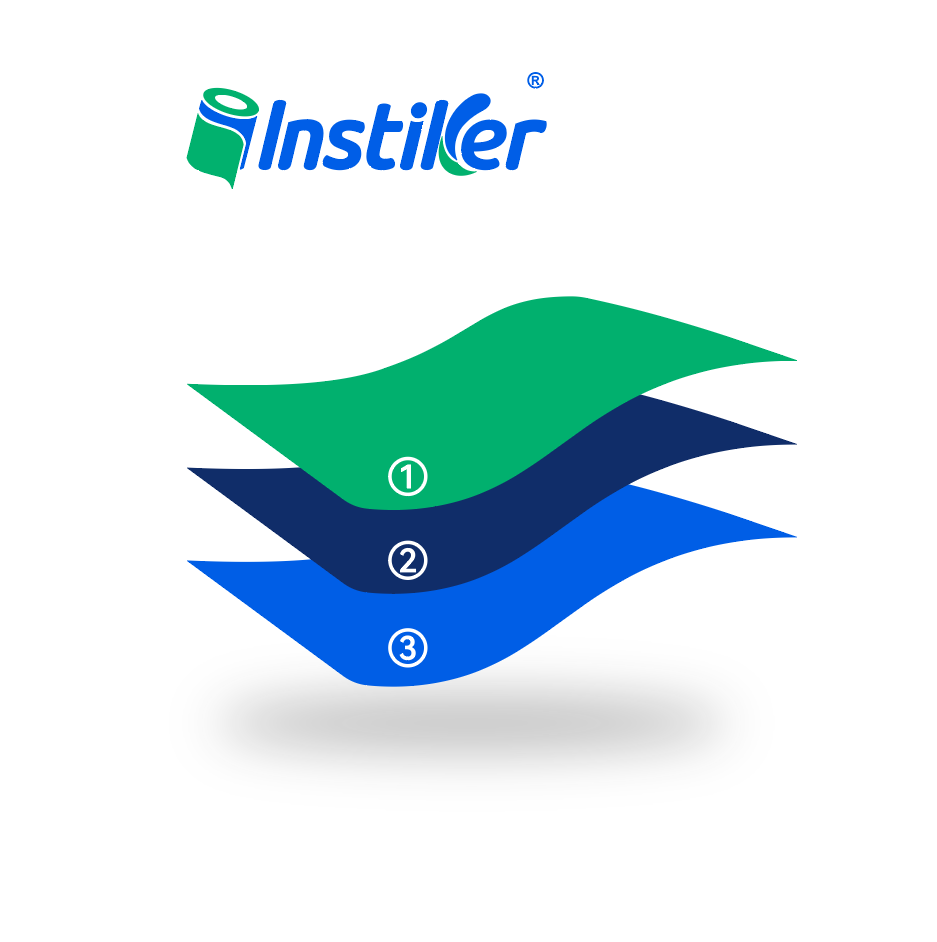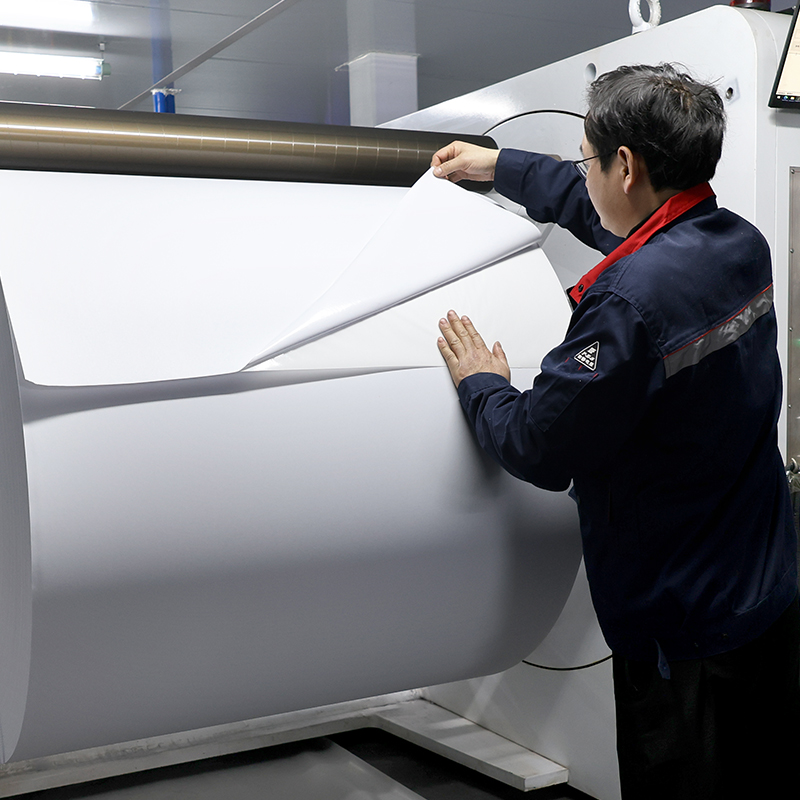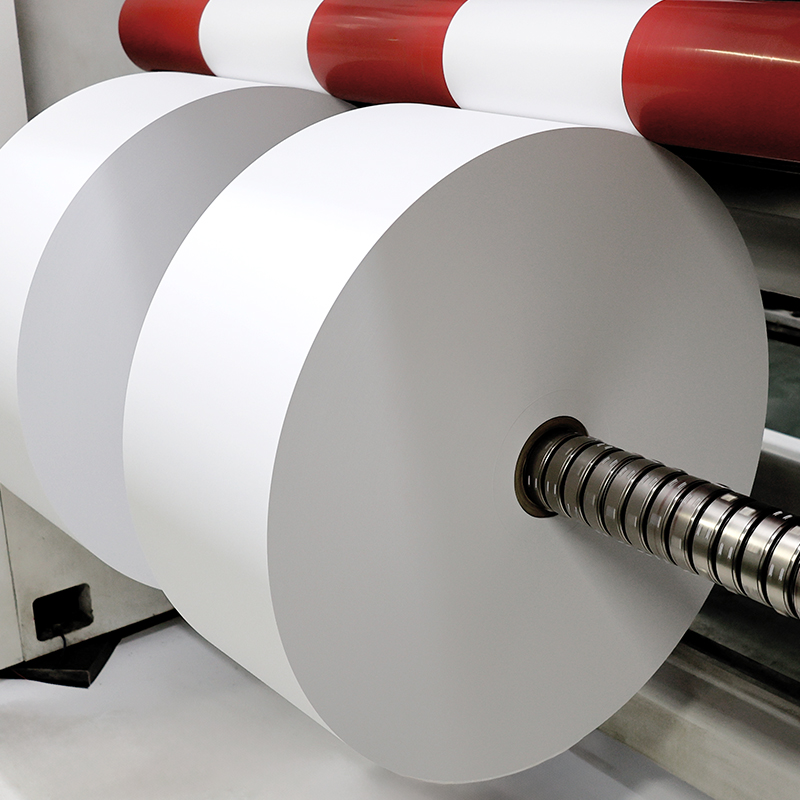Email:
Tel:
+86-18023461748
378 Maxin Road , Zhongluotan Town ,
Baiyun District , Guangzhou City China













YH20453
Instiker
| Color: | |
|---|---|
| Size: | |
| Material: | |
| Application: | |
| Availability: | |
| Quantity: | |

Product Name: 54μ Matt White PP Acrylic 60g white Glassine
1. Face Stock: Matt White PP
Caliper (μm). 67±5% GB/T 451.3-2003
Weight (g/㎡): 69±5% GB/T 451.2-2002
2. Adhesive Performance: Acrylic
Initial Adhesion (N): 9.73 FTM 9
20 min.180'Peel Adhesion (N/25mm) : 7.14/7.24 FTM 1
20 min.90'Peel Adhesion (N/25mm): 8.5 FTM 2
Storage Temperature: -15°C to 70°C
Minimum Lakelling Temperature: 10°C
3. Liner: White Glassine
Caliper (μm): 52±5% GB/T 451.3-2003
Weight (g/㎡): 60±5% GB/T 451.3-2003
It can be stored for 1 year at the temperature of 23+2°C and relative humidity of 50+5%
It is widely used in bar code printing and normal printing, die-cutting performance is excel-White Glassine lent. Excellent performance on many packaging materials.
It is widely used in various printing processes. Attention should be paid to controlling the viscosity of the ink to avoid the loss of the coating caused by over-viscous ink. Avoid exces-sive rewinding tension, which may cause label glue overflow. Simple text printing and bar code printing are recommended.
* Cosmetics and daily chemical product labels: Labels for shampoo bottles and cleaner containers.
* Outdoor signs: Equipment labels for short-term outdoor use (such as shared bicycles).
* Medical labels: Moisture-proof labels for medicine bottles and medical devices.
Q: Is this label fully recyclable?
A: Yes, the synthetic face stock and recycled kraft liner are both recyclable in plastic and paper streams, respectively. Remove adhesive residue before recycling.
Q: Can it be composted?
A: The face stock and adhesive are certified for industrial composting (OK Compost Industrial), breaking down into organic matter within 12 weeks under controlled conditions.
Q: How does it compare to traditional paper labels in wet environments?
A: The synthetic fibers repel water, making it 300% more moisture-resistant than kraft or paper labels, ideal for refrigerated or outdoor applications.
Q: Does the eco-friendly adhesive affect bonding strength?
A: No, the plant-based adhesive matches the performance of traditional acrylic adhesives, with a peel adhesion of 10N/25mm on stainless steel, ensuring reliable substrate bonding.



Product Name: 54μ Matt White PP Acrylic 60g white Glassine
1. Face Stock: Matt White PP
Caliper (μm). 67±5% GB/T 451.3-2003
Weight (g/㎡): 69±5% GB/T 451.2-2002
2. Adhesive Performance: Acrylic
Initial Adhesion (N): 9.73 FTM 9
20 min.180'Peel Adhesion (N/25mm) : 7.14/7.24 FTM 1
20 min.90'Peel Adhesion (N/25mm): 8.5 FTM 2
Storage Temperature: -15°C to 70°C
Minimum Lakelling Temperature: 10°C
3. Liner: White Glassine
Caliper (μm): 52±5% GB/T 451.3-2003
Weight (g/㎡): 60±5% GB/T 451.3-2003
It can be stored for 1 year at the temperature of 23+2°C and relative humidity of 50+5%
It is widely used in bar code printing and normal printing, die-cutting performance is excel-White Glassine lent. Excellent performance on many packaging materials.
It is widely used in various printing processes. Attention should be paid to controlling the viscosity of the ink to avoid the loss of the coating caused by over-viscous ink. Avoid exces-sive rewinding tension, which may cause label glue overflow. Simple text printing and bar code printing are recommended.
* Cosmetics and daily chemical product labels: Labels for shampoo bottles and cleaner containers.
* Outdoor signs: Equipment labels for short-term outdoor use (such as shared bicycles).
* Medical labels: Moisture-proof labels for medicine bottles and medical devices.
Q: Is this label fully recyclable?
A: Yes, the synthetic face stock and recycled kraft liner are both recyclable in plastic and paper streams, respectively. Remove adhesive residue before recycling.
Q: Can it be composted?
A: The face stock and adhesive are certified for industrial composting (OK Compost Industrial), breaking down into organic matter within 12 weeks under controlled conditions.
Q: How does it compare to traditional paper labels in wet environments?
A: The synthetic fibers repel water, making it 300% more moisture-resistant than kraft or paper labels, ideal for refrigerated or outdoor applications.
Q: Does the eco-friendly adhesive affect bonding strength?
A: No, the plant-based adhesive matches the performance of traditional acrylic adhesives, with a peel adhesion of 10N/25mm on stainless steel, ensuring reliable substrate bonding.


The Synthetic paper PP self-adhesive (polypropylene material) features water resistance, tear resistance, and chemical corrosion resistance, and is widely used in labels, packaging, outdoor signage and other fields.
The acrylic adhesive provides a strong and reliable bond. It adheres well to a wide range of surfaces, including plastic, metal, and cardboard. This adhesive is resistant to environmental factors such as humidity and moderate temperature changes, ensuring that the labels stay firmly in place over time.
The 60g white glassine liner protects the acrylic adhesive during storage and transportation. Its smooth surface allows for easy release of the label, which is essential for efficient application in high - volume production settings.

The Synthetic paper PP self-adhesive (polypropylene material) features water resistance, tear resistance, and chemical corrosion resistance, and is widely used in labels, packaging, outdoor signage and other fields.
The acrylic adhesive provides a strong and reliable bond. It adheres well to a wide range of surfaces, including plastic, metal, and cardboard. This adhesive is resistant to environmental factors such as humidity and moderate temperature changes, ensuring that the labels stay firmly in place over time.
The 60g white glassine liner protects the acrylic adhesive during storage and transportation. Its smooth surface allows for easy release of the label, which is essential for efficient application in high - volume production settings.

The printing and processing of synthetic paper PP self-adhesive need to be comprehensively optimized in combination with material properties, equipment performance and application scenarios. The key lies in pretreatment to enhance surface adhesion, selecting matching inks/ribbons, precisely controlling die-cutting and slitting processes, and ensuring label durability through post-treatment (lamination, inspection). In actual operation, it is recommended to conduct a small sample test first to verify the printing effect and process parameters before mass production.
The printing and processing of synthetic paper PP self-adhesive need to be comprehensively optimized in combination with material properties, equipment performance and application scenarios. The key lies in pretreatment to enhance surface adhesion, selecting matching inks/ribbons, precisely controlling die-cutting and slitting processes, and ensuring label durability through post-treatment (lamination, inspection). In actual operation, it is recommended to conduct a small sample test first to verify the printing effect and process parameters before mass production.